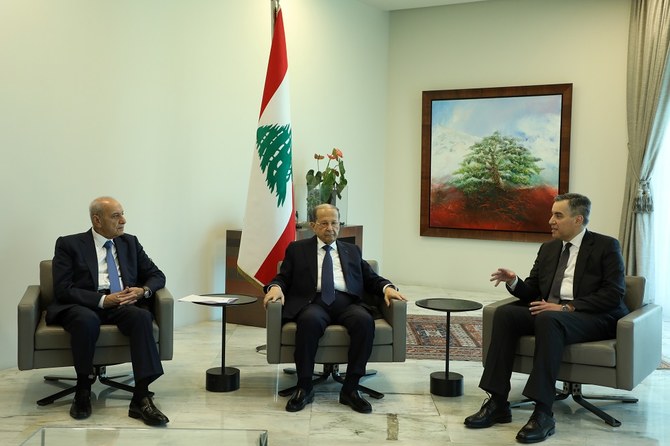BEIRUT: Lebanon’s prime minister-designate on Monday visited areas devastated by a huge blast in the capital and pledged to “put the country on the right path,” having secured support from a majority of lawmakers to form a new government.
Mustapha Adib, Lebanon’s 48-year-old ambassador to Germany, was nominated as prime minister by 90 MPs.
The previous government resigned following the explosion at the Port of Beirut and Abid must form a new one. He is also tasked with resolving the country’s economic and financial crises and tackling the coronavirus pandemic.
Opinion
This section contains relevant reference points, placed in (Opinion field)
Adib announced from the Presidential Palace that he would select a working group of specialists to form his government and start work quickly to “put the country on the right path.”
“In these difficult circumstances our country is going through, there is no time for talk, promises and wishes,” he said. “It is a time for action for the recovery of our country because the concern is great for all Lebanese. I have accepted the mission and the opportunity in front of our country is narrow, and all the (political) blocs must be aware of that. I tell the Lebanese that we are destined to overcome sorrows and pains and to rise again, and we believe that our country will rise again.”
He asked the Lebanese people to wish him luck in his mission.
One of his first jobs was to visit areas destroyed or damaged by the disaster on Aug. 4, when 2,750 tons of ammonium nitrate exploded in a warehouse and wiped out parts of the city. At least 190 people have died, thousands have been wounded and hundreds of thousands have been displaced from their homes.

Lebanon's newly-appointed Prime Minister Mustapha Adib (C) visits Beirut's badly-hit Gemmayzeh neighborhood. (AFP)
He walked with guards in the streets of Gemmayzeh and Mar Mikhael, talking to people to check on their well-being and promising them that he would work with the government as soon as it was formed to “accelerate investigations” and either restore their residences or expedite their return home.
Reactions to his visit were mixed. Some told him of their plight, while others rejected him or demanded to know the truth behind the explosion in honor of those who had died.
Adib, who was ambassador to Germany from 2013, holds a doctorate in law and political science. He began his career as a professor of international law, constitutional law, geopolitics and international relations at different universities in Lebanon and France.
He is president of the Lebanese Association for International Law, the Lebanese Political Science Association, and a member of the French University Alumni Association, the Arab Society for Political Science, the International Association of Constitutional Law, and the Lebanese Foundation for Permanent Civil Peace. He was adviser to former Prime Minister Najib Mikati from 2000 until he was appointed ambassador.
Adib is due to start nonbinding parliamentary consultations with different political blocs on Wednesday.
It was former Prime Minister Saad Hariri, who resigned last year after months of street protests, who nominated Adib. The choice was agreed on between political parties.
Hariri said after these consultations that the next goal was to reconstruct Beirut, achieve reforms and an agreement with the IMF to win the support of the international community and “control the collapse.”
“To achieve these goals the government must consist of people known for their competence, integrity and proficiency,” he added. “It should be formed quickly and the ministerial statement should also be drafted quickly. The country today needs solutions and not maneuvers, and reforms must be undertaken to restore international confidence.”
The leader of the Free Patriotic Movement Gebran Bassil, who is Hariri’s political opponent, said that Adib’s nomination represented the choice with the widest political backing.
“Secondly, he is a person with expertise and experience in government work, and thirdly, he can communicate with the international community and the Lebanese,” he added. “We are committed to facilitating the formation of the government quickly, and we will show the necessary flexibility for that.”
Investigations into the port blast continue against this backdrop of heightened political activity. Judicial investigator Judge Fadi Sawan issued arrest warrants for the director-general of maritime transport, Abdel Hafiz Al-Qaisi, and the head of the port, Mohammed al-Mawla, at the request of the Public Prosecution.
On Tuesday Sawan will hear from the security officers responsible at the port. The World Bank Group, in cooperation with the UN and the EU, said that damage to physical assets ranged from $3.8 billion to $4.6 billion. Losses, including changes in economic flows as a result of the decline in the output of economic sectors, were estimated between $2.9 to $3.5 billion.
It said that the most affected sectors were housing and transportation, and tangible and intangible cultural assets, including religious and archaeological sites, national monuments, theaters, archives, libraries, and antiquities.
It estimated that the needs for public sector reconstruction and recovery, for this year and next, were between $1.8 billion and $2.2 billion. “In the near future between $605 million and $760 million will be required until Dec. 2020, and from $1.18 billion to $1.46 billion will be required in the short term for 2021.
The needs of the transport sector are the highest among other sectors, followed by cultural heritage and housing.”

























